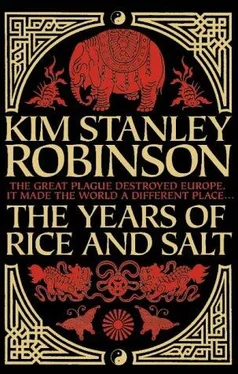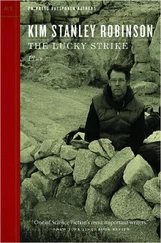Kim Robinson - The Years of Rice and Salt
Здесь есть возможность читать онлайн «Kim Robinson - The Years of Rice and Salt» весь текст электронной книги совершенно бесплатно (целиком полную версию без сокращений). В некоторых случаях можно слушать аудио, скачать через торрент в формате fb2 и присутствует краткое содержание. Год выпуска: 2003, ISBN: 2003, Издательство: Bantam Books, Жанр: Альтернативная история, на английском языке. Описание произведения, (предисловие) а так же отзывы посетителей доступны на портале библиотеки ЛибКат.
- Название:The Years of Rice and Salt
- Автор:
- Издательство:Bantam Books
- Жанр:
- Год:2003
- ISBN:0-553-10920-0
- Рейтинг книги:5 / 5. Голосов: 1
-
Избранное:Добавить в избранное
- Отзывы:
-
Ваша оценка:
- 100
- 1
- 2
- 3
- 4
- 5
The Years of Rice and Salt: краткое содержание, описание и аннотация
Предлагаем к чтению аннотацию, описание, краткое содержание или предисловие (зависит от того, что написал сам автор книги «The Years of Rice and Salt»). Если вы не нашли необходимую информацию о книге — напишите в комментариях, мы постараемся отыскать её.
The Years of Rice and Salt — читать онлайн бесплатно полную книгу (весь текст) целиком
Ниже представлен текст книги, разбитый по страницам. Система сохранения места последней прочитанной страницы, позволяет с удобством читать онлайн бесплатно книгу «The Years of Rice and Salt», без необходимости каждый раз заново искать на чём Вы остановились. Поставьте закладку, и сможете в любой момент перейти на страницу, на которой закончили чтение.
Интервал:
Закладка:
From Calicut they sailed south to Lanka. Here the slaves were left aboard the ship, while the soldiers went ashore and disappeared for several days. The behavior of the officers left behind made Bold think the detachment was out on a campaign, and he watched them as closely as he could as the days passed and they grew more nervous. Bold could not guess what they might do if Zheng He did not return, but he did not think they would sail away. Indeed the fire officers were hard at work laying out their array of incendiaries, when the admiral’s barge and the other boats came flying back out of Lanka’s inner harbor, and their men came aboard shouting triumphantly. Not only had they fought their way out of an inland trap, they said, but they had captured the treacherous local usurper who had laid the trap, and taken the rightful king as well—though there seemed to be some confusion in the story as to which was which, and why they should abduct the rightful king as well as the usurper. Most amazing of all, they said that the rightful king had had in his possession the island’s holiest relic, a tooth of the Buddha, called the Dalada. Zheng held up the little gold reliquary to show all aboard this prize. An eyetooth, apparently. Crew, passengers, slaves, all spontaneously roared their acclaim, in throat-tearing shouts that went on and on.
“This is a great bit of fortune,” Bold told Kyu when the awful noise died down, pressing his hands together and reciting the Descent Into Lanka Sutra. In fact it was so much good fortune it frightened him. And there was no doubt that fright had been a big part of the roar of the crew. The Buddha had blessed Lanka, it was one of his special lands, with a branch of his Bodhi Tree growing in its soil, and his mineralized tears still falling off the sides of the sacred mountain in the island’s center, the one that was topped by Adam’s footprint. Surely it was not right to take the Dalada away from its rightful place in such a holy land. There was an affront in the act that could not be denied.
As they sailed east, the story circulated through the ship that the Dalada was proof of the deposed king’s right to rule; it would be returned to Lanka when the Yongle Emperor determined the rights of the case. The slaves were reassured by this news.
“So the emperor of China will decide who rules that island,” Kyu said. Bold nodded. The Yongle Emperor had himself come to the throne in a violent coup, so it was not clear to Bold which of the two Lankan contenders he would favor. Meanwhile, they had the Dalada on board. “It’s good,” he said to Kyu after thinking it over some more. “Nothing bad can happen to us on this voyage, anyway.”
And so it proved. Black squalls, bearing directly down on them, unaccountably evaporated just as they struck. Giant seas rocked all the horizons, great dragon tails visibly whipping up the waves, while they sailed serenely over a moving flat calm at their center. They even sailed through the Malacca Strait without hindrance from Palembanque, or, north of that, from the myriad pirates of Cham, or the Japanese wakou—though, as Kyu pointed out, no pirate in his right mind would challenge a fleet so huge and powerful, tooth of the Buddha or not.
Then as they sailed into the South China Sea, someone saw the Dalada floating about the ship at night, as if, he said, it were a little candle flame. “How does he know it wasn’t a candle flame?” Kyu asked. But the next morning the sky dawned red. Black clouds rolled over the horizon in a line from the south, in a way that reminded Bold strongly of the storm that had killed Temur.
Driving rain struck, then a violent wind that turned the sea white. Shooting up and down in their dim little room, Bold realized that such a storm was even more frightening at sea than on land. The ship’s astrologer cried out that a great dragon under the sea was angry, and thrashing the water under them. Bold joined the other slaves in holding to the gratings and looking out their little holes to see if they could catch sight of spine or claw or snout of this dragon, but the spume flying over the white water obscured the surface. Bold thought he might have seen part of a dark green tail in the foam.
Wind shrieks through the nine masts,
All bare of sail. The great ship tilts in the wind,
Rolls side to side, and the little ships
Accompanying them bob like corks,
In and out of view through the grating.
In storms like this, nothing to be done but hold on!
Bold and Kyu cling fast to the wall,
Listening through the howl for the officers’ shouts
And the thumping feet of the sailors
Doing what they can to secure the sails
And then to tie the tiller securely in place.
They hear the fear in the officers,
And sense it in the sailors’ feet.
Even belowdecks they are wet with spray.
Up on the great poop deck the officers and astrologers performed some sort of ceremony of appeasement, and Zheng He himself could be heard calling out to Tianfei, the Chinese goddess of safety at sea.
“Let the dark water dragons go down into the sea, and leave us free from calamity! Humbly, respectfully, piously, we offer up this flagon of wine, offer it once and offer it again, pouring out this fine, fragrant wine! That our sails may meet favorable winds, that the sea-lanes be peaceful, that the all-seeing and all-hearing spirit-soldiers of winds and seasons, the wave-quellers and swell-drinkers, the airborne immortals, the god of the year, and the protectress of our ship, the Celestial Consort, brilliant, divine, marvelous, responsive, mysterious Tianfei might save us!”
Looking up through the dripping cracks in the deck Bold could see a composite vision of sailors watching this ceremony, mouths all open wide shouting against the wind’s roar. Their guard yelled at them, “Pray to Tianfei, pray to the Celestial Consort, the sailor’s only friend! Pray for her intercession! All of you! Much more of this wind and the ship will be torn apart!”
“Tianfei preserve us,” Bold chanted, squeezing Kyu to indicate he should do the same. The black boy said nothing. He pointed up at the forward masts, however, which they could see through the hatchway grating, and Bold looked up and saw red filaments of light dancing between the masts: balls of light, like Chinese lanterns without the paper or the fire, glowing at the top of the mast and over it, illuminating the flying rain and even the black bottoms of the clouds that were peeling by overhead. The otherworldly beauty of the sight tempered the terror of it; Bold and everyone else moved outside the realm of terror, it was too strange and awesome a sight to worry any longer about life or death. All the men were crying out, praying at the top of their lungs. Tianfei coalesced out of the dancing red light, her figure gleaming brightly over them, and the wind diminished all at once. The seas calmed around them. Tianfei dissipated, ran redly out the rigging and back into the air. Now their grateful voices could be heard above the wind. Whitecaps still toppled and rolled, but all at a distance from them, halfway to the horizon.
“Tianfei!” Bold shouted with the rest. “Tianfei!”
Zheng He stood at the poop rail and raised both hands in a light rain. He shouted “Tianfei! Tianfei has saved us!” and they all bellowed it with him, filled with joy in the same way the air had been filled with the red light of the goddess. Later the wind blew hard again, but they had no fear.
How the rest of the voyage home went is not really material; nothing of note happened, they made it back safely, and what happened after that you can find out by reading the next chapter.
5
Storm-tossed, Tianfei-protected, the treasure fleet sailed into a big estuary. Ashore, behind a great seawall, stood the rooftops of a vast city. Even the part visible from the ship was bigger than all the cities Bold had ever seen put together—all the bazaars of central Asia, the Indian cities Temur had razed, the ghost towns of Frengistan, the white seaside towns of Zanj, Calicut—all combined would have occupied only a quarter or a third of the land covered by this forest of rooftops, this steppe of rooftops, extending all the way to distant hills visible to the west.
Читать дальшеИнтервал:
Закладка:
Похожие книги на «The Years of Rice and Salt»
Представляем Вашему вниманию похожие книги на «The Years of Rice and Salt» списком для выбора. Мы отобрали схожую по названию и смыслу литературу в надежде предоставить читателям больше вариантов отыскать новые, интересные, ещё непрочитанные произведения.
Обсуждение, отзывы о книге «The Years of Rice and Salt» и просто собственные мнения читателей. Оставьте ваши комментарии, напишите, что Вы думаете о произведении, его смысле или главных героях. Укажите что конкретно понравилось, а что нет, и почему Вы так считаете.












